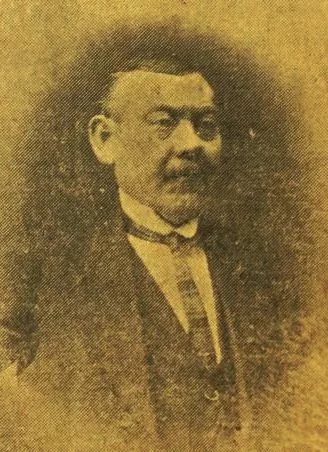 Introduction:
Introduction:
Elia Refael Karmona (1869-1931) was the most prolific author in the modern history of Ladino. He published at least 55 novels and also founded and directed El Jugeton, a humoristic journal where some of his literary works appeared.
We can draw much information about Karmona’s life from his autobiography, published in 1925. There, he recounts his family’s history, which was once wealthy and respected but, during Karmona’s childhood, had declined and fell to poverty. His father became a ticket seller for the tram company. Karmona attended the Alliance school in his neighborhood but, when he was 15, his father removed him from school to help with the family’s finances. In his youth, he had many different employments – as a French teach (even though he did not know French well), a printer, and a street vendor selling papers and matches. Eventually, afflicted by shame and despair, he decided to try a new profession and became an author. But I was not his own idea; rather, it was his mother who suggested it and dictated to him the stories that became him first konsejas.
One of Karmona’s most interested works, and my own personal favorite, is the novel The Courageous Captain (El kapitan korajozo). It is an adaptation of Alexandre Dumas’ popular French novel The Count of Monte Cristo (1844). Borrowing the plot structure of the French novel, Karmona crafted an Ottoman historical novel that depicts the final years of the despotic rule of Abdul Hamid II and the Young Turk Revolution of 1908. The protagonist a Greek sailor named Georgy who is accused of being a revolutionary and incarcerated in a terrible prison in Syria. In this manner, the novel portrays not only a story of love and betrayal, the traditional hallmarks of the sentimental melodrama, but also political issues – the despotism of the Sultan, the oppression of Ottoman subjects, and the hopes tied with the Revolution. Curiously, the novel does not feature a single Jewish character, casting instead Greeks and Armenian – members of other Ottoman minorities – as well as a Frenchman as the main villain. As you will see in the first chapter below, the novel displays profound interest in Ottoman politics and history.
Kapitolo 1
The story I am about to tell you took place in Istanbul beginning on Sunday, December 14th, 1902. At the dawn of a clear and beautiful day, the sun was bright as though it was summer, and many people took to the streets without even taking a coat.
At the old Taksim square, there was much clamor since early morning. Particularly in front of the large church, many people, sweating all over, came and went in a hurry. Anyone who stood by the door of this temple, they could see very well the grand decor inside. Rich tapestries were hung from high above and beautiful vases filled with flowers placed on the windowsills along the walls. The entire space was illuminated and all the sacred objects of silver and gold that the church possessed were on display. In front of the door, people were awaiting, and every quarter of an hour more curious observers arrived.
What was happening in this place, with so much commotion around it?
On this day, this sacred place would house the wedding ceremony of Georgy, the son of a gardener, and the graceful Señorita Emilia Lavroniades, the daughter of a banker well-known in our city.
More than all other rich weddings, this one attracted much curious folk, for the sole reason
that this wedding greatly enchanted the whole Greek community.
Señorita Emilia was the only daughter of this banker and was brought up with serious education, nothing spared, and was a rare beauty. She was almost twenty years old, a bit full with a round figure, blondish hair, and eyes that could melt the heart of the most serious man. She grew up amidst the wealthy families of Arnavutköy and was a desirable bride for many young men in high positions, some in banks and some in commerce, but this beauty refused everyone, saying that she must marry someone who will bring her happiness. Whether he was rich or poor, it didn’t matter to her.
The noises coming from the place of the wedding between the graceful Emilia and Captain Georgy enchanted the local inhabitants. Captain Georgy was not poor, he had a good job, but he was the son of a gardener who worked for Emilia’s father.
And how did Mr. Lavroniades come to accept the son of his own gardener as a son-in-law? Emilia herself was very educated, so how did she refuse so many handsome young men only to marry someone who was raised in her household as charity? That is what attracted even more curiosity, and the crowds gathered at the church from early in the morning.
The wedding was to take place at four o’clock and guests were arriving since two o’clock, filling the isles. At three thirty, a sense of excitement spread among the people, each telling their companions: She is coming! She is coming! The bride is coming! Everyone turned their eyes to the street. A beautiful carriage brought the lovely bride, dressed in white, with her beloved father by her side. Thirty-seven chariots followed, one with a young man dressed in a black tuxedo, a cylindrical hat, who, straightening his white gloves, entered the church, accompanied by his father. Everyone marveled at the sight of this young man, who was no other than Captain Georgy. He walked in, exuding pride, with a smile on his face as he greeted all the friends he encountered on his way.
While the house of prayer was preparing for the ceremony, a formal carriage arrived and stopped in front of the door. Three men dressed in civilian clothing and with the affectation of spies descended and went inside. A few seconds later, an ordinary carriage brought an officer with two police agents, who also went inside with the same poses that our readers are familiar with from the era of tyranny.
At the very moment when the priest rose to give benedictions, the commissar and his companions entered and addressed him:
“Who is Captain Georgy?”
“I am,” responded the groom.
“You are Captain Georgy? The man about to be married now?”
“That is true.”
“In the name of the law, you are under arrest.”
“Arrest?! Me? What for? I have nothing to do with the police.”
“Are you not the first captain of the steamship Sofia?”
“Yes, sir.”
“You always make the voyage between Constantinople and Marseille.”
“Exactly.”
“Very well, you are accused of carrying secret letters between the Young Turks in Paris and those in Constantinople.”
“But, Sir, this is a plot.”
“That is not my business, Mister Captain. You can present your story to my chief.”
“But, sir, I am getting married today, I can guarantee you that tomorrow I will come wherever I am required.”
“That is not possible, sir. You are accused of revolutionary activities, and you must come with me, a carriage is waiting outside.”
Lightning does not strike as powerfully as this news hit everyone in attendance. Everyone bit their lips. Sr. Lavroniades tried to defend his son-in-law, but it was all in vain. The Captain was arrested. Accompanied by the police agents, he was taken from the church, leaving all his relatives and guests in despair, and especially Emilia, who screamed: “Ah! Georgy!” before falling down, fainted.
Fuente: Marina Mayorsky
 eSefarad Noticias del Mundo Sefaradi
eSefarad Noticias del Mundo Sefaradi

